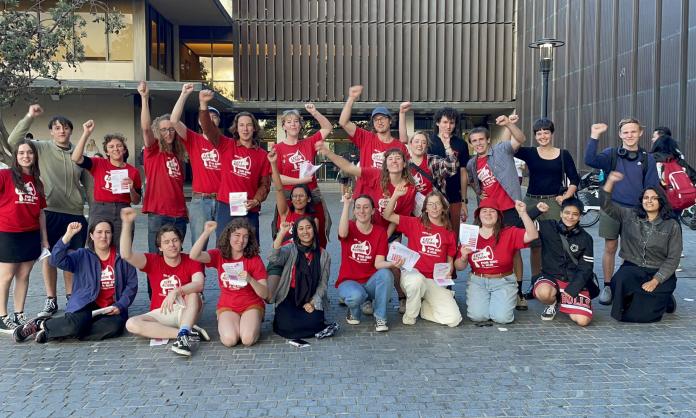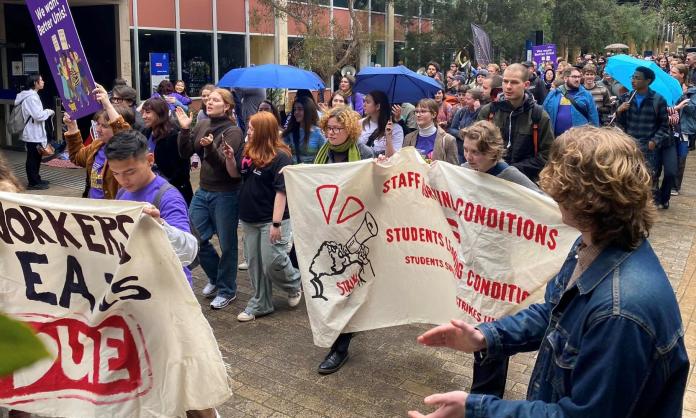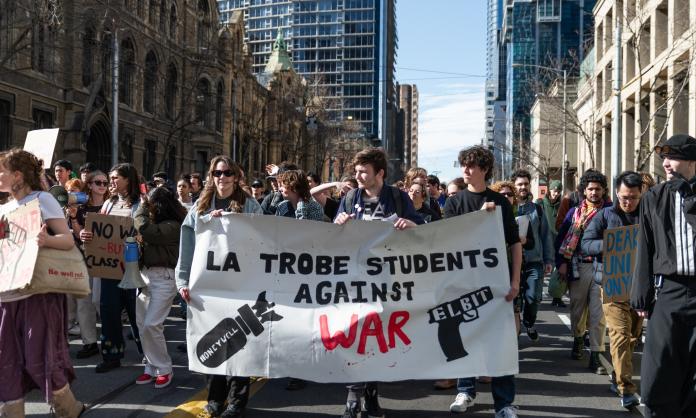Give me an Australian university and I’ll give you at least one right-wing think tank or a partnership with an environment-destroying mining company, a weapons manufacturer or some other heinous entity.
The University of Sydney? At the end of last year, it extended a partnership with Thales, one of the world’s biggest weapons manufacturers, which “aims to accelerate national security outcomes, embedding staff within each other’s organisation”.
The University of Western Australia? It is partnered with Woodside and BHP, two of Australia’s major fossil fuel companies, which sponsor the E-Zone building on campus. Woodside is also partnered with Monash University, where it co-runs the FutureLab on campus. The FutureLab doesn’t advertise what the future of the planet will look like if Woodside keeps making billions from fossil fuel extraction.
The University of Melbourne? This is home to the Robert Menzies Institute, a $7 million propaganda centre run by right-wing culture warriors such as Peta Credlin, a Sky News host and former chief of staff for conservative Prime Minister Tony Abbott.
Why do universities have such ties? To understand this, we need to understand the role that universities play within capitalism.
Capitalism is a system built on intense competition between rival businesses to make as much money as possible. Whichever is most successful can drive out their rivals. One of the main ways this is done is by developing newer, more efficient ways of doing business. When a company employs new technology to automate part of the production process, it can cut jobs, reduce prices and undercut its competition.
Companies often have their own research and development wings. But it can be more cost effective for the capitalist class to gain state subsidies and pool resources. Universities provide an ideal avenue for this. For example, the Australian coal industry has its own research program, ACARP, which, according to its 2022 annual report, oversaw more than $91 million of investments across 277 research projects—171 of them in partnership with fifteen Australian universities.
At its most extreme, competition between capitalists takes the form of military competition between states. Universities are vital here too. For instance, Flinders University recently signed a partnership with universities in the UK and US to help “hundreds of South Australians [begin] to learn the skills required to operate nuclear-powered submarines”.
Capitalism is based on the exploitation of the majority of the population—the working class—by a minority. The capitalists need the means to secure their position at the top. One way is to spread ideas that justify the status quo, either through promoting it as positive, or at the very least as the best we can hope for. Universities, and the education system more generally, fulfil this role.
They are also important for training the people to run the system. Hence every major university boasts a faculty of economics that teaches nothing but neoclassical theory, and a business school and MBA (master of business administration) program for executives and prospective executives.
Further, universities are managed by a council, whose members often come from corporate backgrounds. Take, for instance, University of Sydney Chancellor Belinda Hutchinson. She is currently chair of the Australian subsidiary of Thales and a Qantas board member. She was previously a director at Telstra, Coles Myer, Energy Australia and AGL.
The person most directly in charge of the university is the vice-chancellor. In 2021, fourteen vice-chancellors were paid more than $1 million, putting them well within the top 1 percent of income earners. They are part of the ruling class—well-connected with big business, handsomely compensated and in charge of some of the biggest workplaces in Australia.
Another factor is that universities secure their funding from the government and through partnerships with businesses. They direct their resources where the ruling class most values it precisely to get partnerships with companies and industries.
So if we want to stop universities being used as bases of research and support for destructive industries, we can’t appeal to the good nature of those in charge of the institutions; they are part of the problem.
Instead, we need a radical movement of students and staff, who are at the heart of the universities, to force managers to cut these terrible ties. Ultimately, we need to get rid of capitalism.









